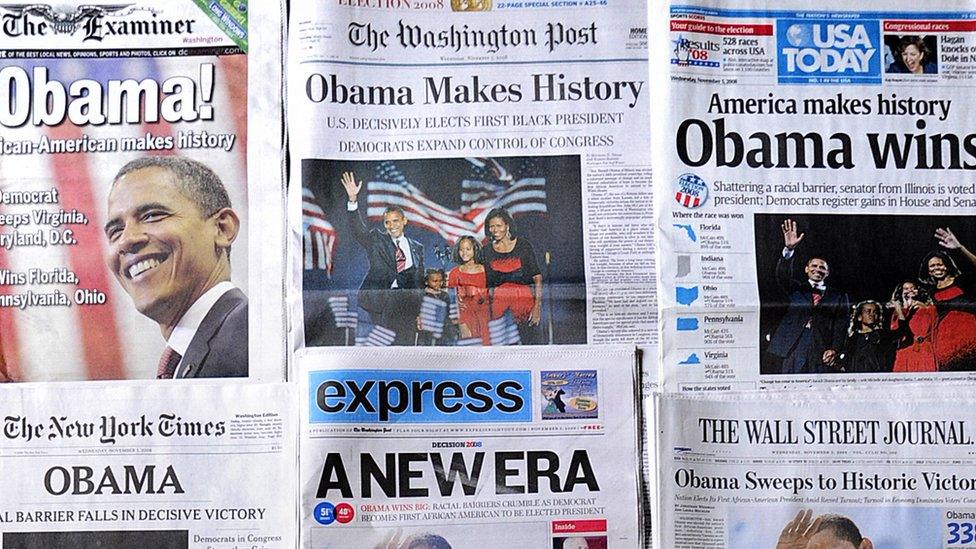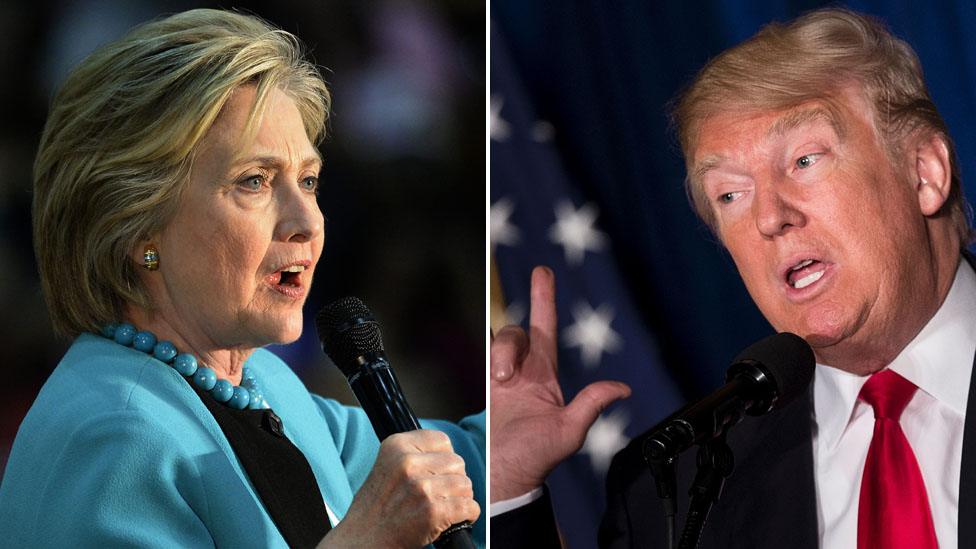US election: Do newspapers' presidential endorsements still matter?
- Published

USA Today has broken with tradition for the first time in its 34-year history and issued a scathing editorial against Republican nominee Donald Trump.
The national newspaper's editorial board, which has never taken sides in a presidential election, stopped short of endorsing Hillary Clinton but declared Mr Trump "unfit for the presidency".
"This year, one of the candidates - Republican nominee Donald Trump - is, by unanimous consensus of the Editorial Board, unfit for the presidency," the board wrote.
The newspaper outlined eight reasons to support its stance, describing Mr Trump as a "serial liar" who "traffics in prejudice" and has "coarsened the national dialogue".
It also highlighted Mrs Clinton's flaws, advising readers to vote for a third-party candidate if they cannot support her.
"Whatever you do, however, resist the siren song of a dangerous demagogue," it concluded.
The newspaper is hardly the first publication to revise its editorial policy in this year's race.
A string of conservative-leaning newspapers have railed against Mr Trump, including the Cincinnati Enquirer and the Arizona Republic, which backed Mrs Clinton in its first endorsement for a Democrat in 126 years.
The publication subsequently received death threats.
US debate: Five Twitter takeaways
Are newspaper endorsements outdated?
In an age saturated in social media and marked by an increasingly fragmented media landscape, the role of newspaper endorsements appears to be dwindling.
In fact, almost seven in 10 Americans said their local newspaper's endorsement had no impact on who they cast their ballot for in 2008, according to a Pew Research Center study, external.
But Keven Ann Willey, editorial page editor for the Dallas Morning News - which has endorsed Mrs Clinton - told the BBC it is because of the wealth of information online that it is more important than ever for institutions rooted in communities to stand up.
"At a time when there are so many voices, we need to speak up and do our civic responsibility to not be over-shouted," she said.
The conservative Dallas Morning News recommended Mrs Clinton for president earlier this month, backing a Democrat for the first time since 1940.
Though the editorial prompted backlash, Mrs Willey said the board felt it was the right thing to do.
"We did consider a no-recommendation," she said, "but voters have to make a choice and encouraging voters not to participate didn't seem right to us".
But recent research shows that newspapers like that Dallas Morning News, which have bucked their own history, are the type of unexpected endorsements that could make a difference.

A recent study, external by economists Agustin Casas (CUNEF, Madrid), Yarine Fawaz (CEMFI, Madrid) and Andre Trindade (FGV, Rio de Janeiro) found that "surprising" endorsements can influence modern presidential elections.
The team examined betting markets, specifically the "daily trading prices of the contract 'Obama to win the election', on the same days of newspaper endorsements during the 2008 and 2012 presidential elections.
The study found that endorsements did improve a candidate's odds of winning, particularly if they were consistent with the newspaper's style and rhetoric, but still come as a surprise to the publication's endorsement history.
Clinton gathers Republican endorsements
For example, the study points to the Chicago Tribune endorsing Mr Obama in 2008 and 2012. While the newspaper's editorial board is historically conservative, the tone of the paper tends to be more moderate.
In backing Mr Obama, the publication remained consistent with its style and language, but made a surprise endorsement by declining to back its typical Republican choice.
"In this election we're seeing many of these type of surprising endorsements," Mr Casas said.
Crossover endorsements
That may be because Mr Trump is not a typical Republican candidate, which means a conservative newspaper's refusal to endorse him does not necessarily contradict its rhetoric.
"In some sense, the conservative newspapers are more free to endorse who they want without seeming inconsistent to what they are preaching," Mr Casas said.
Mr Casas and his team expanded their research on a study published in 2011, external that also reached a similar conclusion by looking at the newspaper endorsement effect on the 2000 and 2004 elections.
Brian Knight, a political scientist at Brown University and a co-author of the study, said crossover endorsements had an overall effect of convincing 1-2% of readers to shift positions in those elections.
Though newspaper circulation has fallen nearly 20% since 2004, Mr Knight said a lot of these unusual endorsements from conservative publications will probably have a big influence on the narrow slice of voters who have yet to make up their mind.
In fact, in such a tight race, a rare endorsement in a swing state could shift the outcome, he added.
For example, the Cincinnati Enquirer's support for Mrs Clinton could sway undecided voters in Ohio, a key US battleground state.
Meanwhile, the Arizona Republic's editorial against Mr Trump may not matter as much in a red state that has not been won by a Democrat since Bill Clinton in 1996. Before that, Harry Truman was the last Democrat to win there in 1948.
At the margins
Paul Beck, a political science professor at Ohio State University who has followed elections for decades, told the BBC newspaper endorsements tend to matter the most to voters "at the margins".
As the race tightens 40 days before the election, reaching those undecided voters "at the margins" may matter most.
In fact, online research firm YouGov estimates about 8% of registered voters who plan to cast a ballot are still undecided.
"There are so many undecided voters in this race fishing around for some kind of guidance for what to do," he said.
These voters, he added, tend to be a mix of people who may not pay much attention to news but skim headlines, and others who are engaged but still uncertain of how they will vote.
"That surprise factor, when a newspaper deviates from its traditional posture, that sends a power signal to readers," he said. "I think it is going to make a lot of people sit up and pay attention."

Surprising endorsements in 2016
The Cincinnati Enquirer: Hillary Clinton
The Arizona Republic: Hillary Clinton
The Dallas Morning News: Hillary Clinton
Houston Chronicle: Hillary Clinton
The Atlantic: Hillary Clinton
New Hampshire Union Leader: Gary Johnson
Richmond Times-Dispatch: Gary Johnson
Chicago Tribune: Gary Johnson

